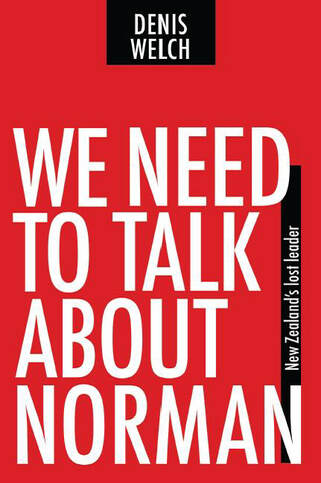
by Denis Welch
Denis Welch’s book is about Norman Kirk, in the first instance, whom he describes as an inspirational leader. Apparently there have only one or two others, and they have also been Labour prime ministers.
The book begins with an attempt to find some continuity between Kirk and recent leaders. But most of the text is a commentary about economic and societal change since the 1970s. This is more interesting, partly because one has to now be a senior citizen to have a full memory of Kirk.
Welch’s book doesn’t have an actual structure – at least there is no contents page, and it reads more like a personal essay. Or perhaps like an old-style Listener article that has been extended. Welch was an political columnist for many years, but is somewhat less convincing as a historian, especially on economic issues.
Everything comes back to what he calls ‘neoliberal ideology’, which apparently has captured the policy process and political leaders since 1984. We are familiar with the policies, and the events of the Rogernomics period, as it was called at the time. Basically it involves opening everything up to international finance, and restricting the role of the elected government in managing money; while every commercial activity has to be undertaken by the private sector.
Welch ends with a list of policy activities that had been initiated or promoted by Kirk’s Labour Government. Some of them were implemented by what were known as ‘statutory corporations’, such as the Development Finance Corporation, or the Housing Corporation. All of these relatively innovative organisations were restructured or privatised in the 1980s, and only ACC remains from that era. So essentially Roger Douglas and co. undid everything that Kirk had attempted to do.
All of this is well known, or has been analysed before, without great insight into the causes. Kirk himself has already been the subject of one detailed biography and the publication of diaries kept by his assistant, Margaret Hayward. Welch does not add a lot of new information here, although there is more detail about Kirk’s failing health following international visits. We already know that Norman Kirk was a modest man, a working class autodidact, and a moral conservative in an age of what he called permissiveness. Although he was deeply mourned at the time was he a transitional figure?
I personally remember when Big Norm died, despite just having started school around the time. I happened to be in Christchurch, in the electorate seat which Kirk held, and where my grandparents lived. Safe to say that not everybody mourned, or that he was universally respected. Denis Welch was then a young man in his twenties, who was actually living in England during the time of Kirk’s premiership. He admits to not having been that impressed at the time; not just with Norman Kirk as a leader, but with New Zealand society, which he describes as being stultifying and too conformist.
Well that portrays the view of the baby boomer, brought up within the regulated welfare state at a time of great prosperity. The society that Kirk defended was in a sense closed, at least because of what was known as the policy of ‘insulation’, aimed at protecting vulnerable industries and jobs, if not all the people. The baby-boomers who returned from their O.E. after 1984 found a much more cosmopolitan culture, and open society, as well as then benefitting from repeated tax cuts and rising property values. Meanwhile the working class disappeared as a political force, and left the field to the professional/managerial stratum, of which the author could be categorised within, if not one he identifies with. Having another charismatic Labour leader hasn’t really changed that structure.
Author: Denis Welch
Publisher: Quentin Wilson Publishing
ISBN: 9781991103055
RRP: $39.99
Available: bookshops

 RSS Feed
RSS Feed
